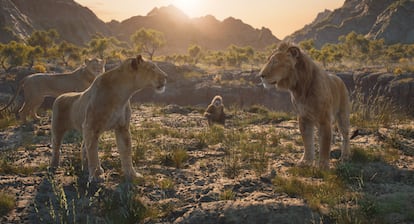At some point in the history of animation, an unlucky mind came to the conclusion that reality could be much more fascinating than art. That for children and their older companions that thing of making drawings, composing characters from nothing with animal features, but with traces of texture, color, shapes and movement that said everything about the interior of the characters almost without need. that they talked about, was beginning to be a thing of the past. That the novelty could be in the realism created with computer generated images, the CGI, without realizing that this is not reality but its ugly simulation, that this is not art but technology, that this is not imagination but an unsmokable chestnut filled with creative laziness.
Mufasa: the lion king, prequel to the 2019 live-action animated film, which in turn was a new version of the outstanding musical work produced in 1994, this cartoon is not as infamous as its predecessor. Barry Jenkins has replaced Jon Favreau, but it is unlikely that the children of this third decade of the 21st century will have in their hearts an unforgettable moment of their lives in the cinema around these images, together with parents, siblings and friends, as they did. They keep in their memory the adults today who were children in the last decade of the 20th century, when the third golden age of animation was taking shape at Disney, between 1989 and 1997, since The little mermaid until Hercules, con The lion king as one of its emotional axes.
If we want reality, we have it in front of us, or in a nature documentary, or in a photograph. But to believe that characters as attractive as Mufasa, Scar, Timon and Pumbaa are going to be closer or more exciting if they are indistinguishable (well, they think so) from any jungle animal is to not have the slightest idea of what it is. a child’s imagination. In the new collection of songs created by Lin-Manuel Miranda for this Mufasa There are a couple of songs with a certain brio (Brother Betrayed, for example), but far from those of Elton John and Tim Rice for the original. And the sequences inside the water, especially those that arise as a result of dangerous floods, cause the necessary unease due to the effects of nature.
However, beyond a couple of specific moments, this origin story, in which we learn about Mufasa’s childhood and youth, and the love-hate relationship with his brother, no matter how well described it is on paper in the script ( and it is relatively effective), collapses from its damned animated hyperrealism lacking in expressiveness, with which all the lions, as it could not be otherwise, could be the same.
The fact that Jenkins, director of the magnificent Moonlight, Oscar for the best film of 2017, has decided to sign with Disney to have minimal opportunities to contribute art to what is pure technology. Something that, of course, is not able to demonstrate because there is not a crumb of great cinema in Mufasa. If we add to this that last week JC Chandor, director of works as formidable as Margin Call y The most violent year, released a monstrosity like Kraven The Hunter, This one for Marvel, we have a sign that finally says much more about the human race than about the industry itself. That executives want to give a veneer of prestige to the most basic eggs of hens that at some point bred gold is less criticizable than the abominable accommodation reached by certain filmmakers who are also auteurs. And it’s not about devaluing Disney or Marvel per se, but about knowing where you are: in life and in creation.
Mufasa: the lion king
Address: Barry Jenkins.
Interpreters: Aaron Pierre, Kelvin Harrison Jr., Tiffany Boone, Seth Rogen (voces).
Gender: animation. USA, 2024.
Duration: 120 minutes.
Premiere: December 20.

